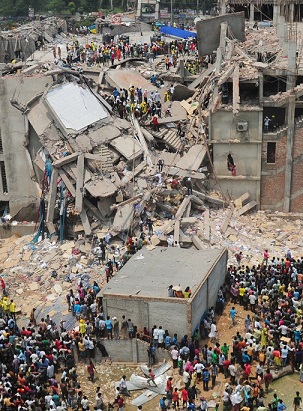Training and payments promised after tragic collapse
 The International Labour Organization (ILO) has taken steps in response to the horrendous working conditions of many factories in Bangladesh, following the recent deaths of over a thousand workers.
The International Labour Organization (ILO) has taken steps in response to the horrendous working conditions of many factories in Bangladesh, following the recent deaths of over a thousand workers.
The ILO says it has combined forces with the Bangladeshi government to launch a new initiative to improve safety, specifically targeting the ready-made-garment (RMG) sector.
Action was prompted after the collapse of the Rana Plaza factory complex in April killed hundreds of workers.
A three and a half year effort has been embarked upon in combination with the recent safety accord signed by most of the international companies that operate factories in the impoverished republic.
Efforts will include; safety training for machine operators, safety committees at every factory with over 50 staff, and rehabilitation for disabled workers who have been injured at work during the past.
Factories not signed-up to the safety accord will also undergo inspections for structural integrity and safe operating practices.
Srinivas Reddy, the director of the ILO in Bangladesh, says: “This program will ensure that all of these efforts are coordinated in a way that leads to sustainable change and will have long term impact on the industry for the betterment of the safety and working conditions.”
Several large Australian companies have come under consumer-driven pressure, since revelations they source their material from the Bangladeshi garment district. Big W and Target have admitted to sourcing fabric for their clothes from a garment factory that burned down earlier this month, killing at least eight people.
Daisy Gardener, the Corporate Accountability and Fair Trade Advisor with Oxfam Australia, says; “We really think that Australians do connect to the fact that these clothes are being made in Bangladesh that we're wearing everyday and we do hope that Australians will continue to ask companies that haven't joined the accord, like Best and Less and Pacific Brands, Rivers and the Just Group, who own Just Jeans.”
“We're really hoping that Australians will keep up the pressure and ask those companies to sign onto the accord as well.”
Woolworths received piles of letters and hundreds of Facebook posts, pushing them to sign the accord.







 Print
Print